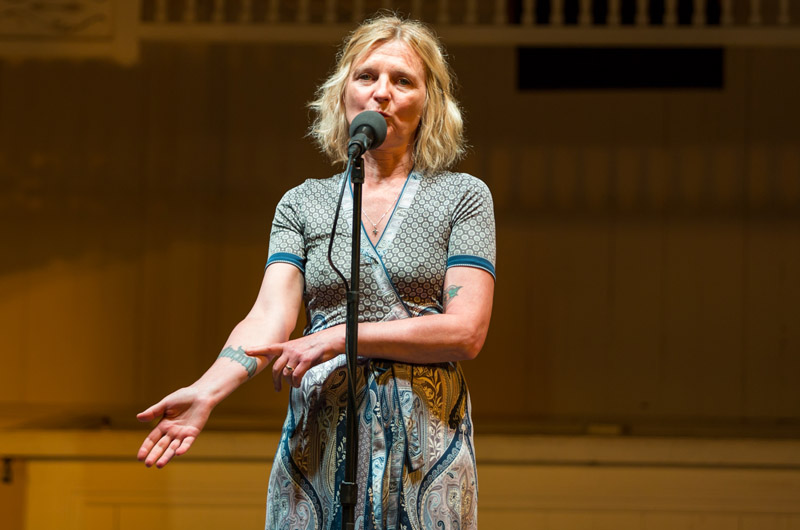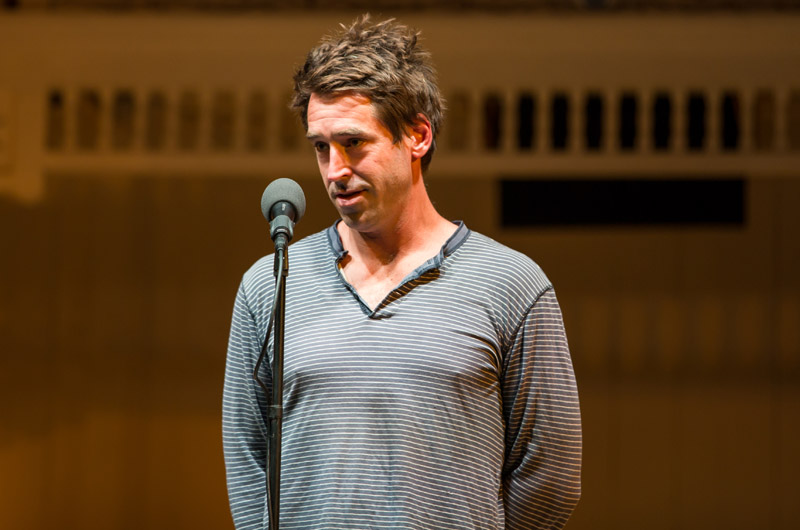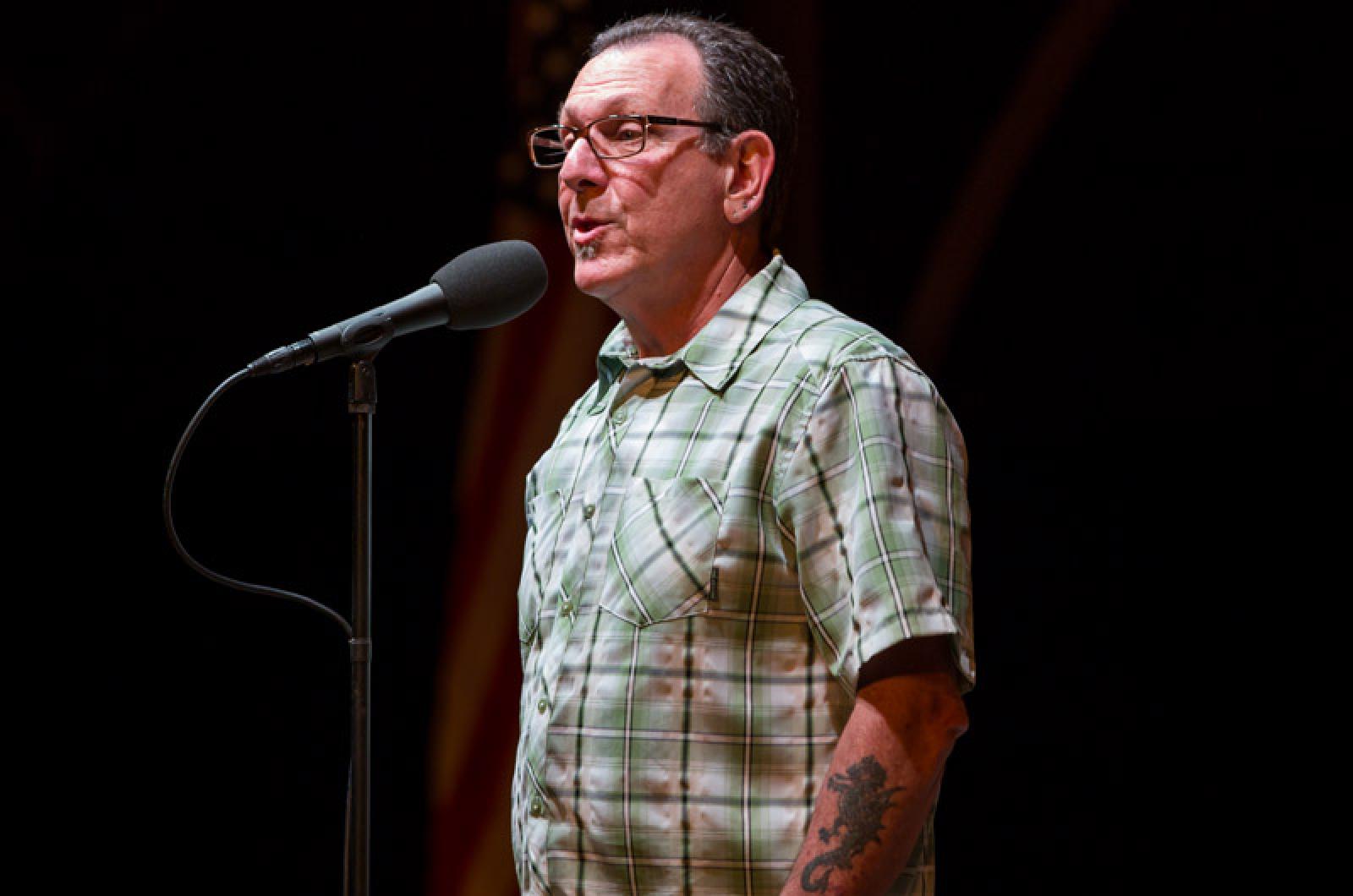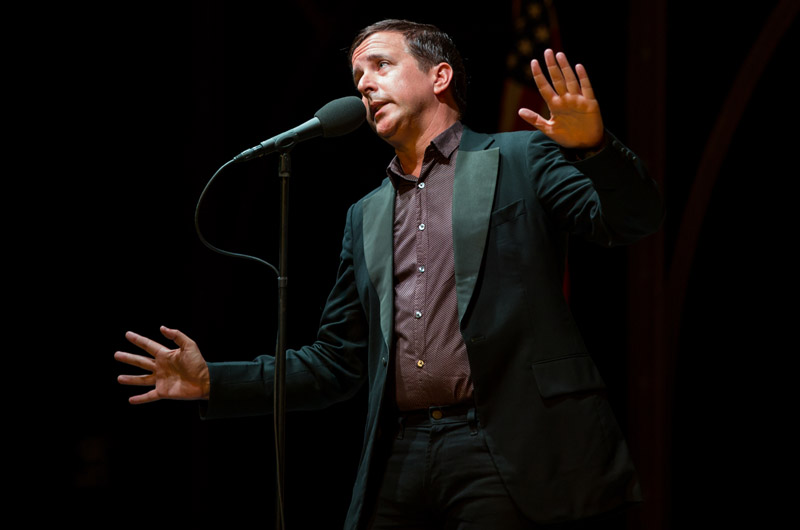Much like moths around a lamp, a crowd of Vineyarders and visitors gathered last Friday at the Tabernacle in Oak Bluffs to hear true stories told live, ranging from a jury duty experience to a visit to a war-torn village, as part of The Moth, presented by WCAI.
The evening began with stirring violin music played by Mary Wolverton before Dan Kennedy took the stage as host.
Mr. Kennedy encouraged the audience to give a warm and loud reception to the storytellers on stage, who presented their tales without notes or props of any kind. Mr. Kennedy goaded the crowd by saying that the Vineyard had a ways to go to outshine the energy from Nantucket, where The Moth had been several days prior.
“I don’t want to start a competition between you guys,” he joked to the jeers and laughter of the Vineyard crowd.

Danusia Trevino, who grew up in Poland, started the evening off with story that began under seemingly banal circumstances: a jury summons. But her experience serving on the jury when she was a self-described 30 year-old in rebellion was transformational.
“When today somebody says, I don’t want to do jury duty, and jury duty sucks, I say, you never know what could happen,” she said. “So go.”
Her story involved choosing to let a man go free because of a lack of sufficient evidence, a primer in the American judicial principle of “innocent until proven guilty” that she had been unaware of previously.
The next storyteller, Chris Fischer, told a tale that began with his growing up on the Vineyard and being taught by his father how to skin a deer, and ended with his serving dinner to the President of the United States at the Beach Plum Inn, where for a time Mr. Fischer was the head chef.

“I look out the window and there’s a storm of secret service men inspecting our stone walls and our sheds and our grounds,” said Mr. Fischer. “And I thought, this is probably the night.”
Mr. Fischer, the author of the recently published Beetlebung Farm Cookbook, spoke of his farming roots and that of his crew as they prepared dinner to the President and First Lady while a cavalcade of secret service agents inspected and monitored every part of the process.
“I was reminded that we are the privileged ones,” he said as he finished his story. “To be born here, to be proud of where we’re from.”
Mr. Fischer was followed by by Cybele Abbett, who told her story about her child coming out to her as transgender.
Paul Munafo began his story with a harrowing account of his journey to Massachusetts General Hospital in Boston in the middle of the night to receive a liver transplant that ultimately never happened. He had received a call from the hospital at midnight and he and his wife called the harbor master Jay Wilbur for help, as there were no other boats or planes available at that time of the night. They had to get to Mass General by 3 a.m., which they did, but the transplant, like many subsequent trips to the hospital, was called off due to various reasons.
“Each one brought my hopes up really high, but all of them ended the same way,” Mr. Munafo recalled. “No transplant.”
Mr. Munafo said he began to lose hope that a successful transplant would ever occur.
Then one night he received a call, again at around midnight. Mr. Munafo was tired and discouraged and thought about not making the trip but the surgeon urged him to come, saying he had a good feeling about this one. But once again, there was the dilemma of how to get from the Vineyard to Boston in the middle of the night, with even less time to spare for this trip.
A few weeks prior Mr. Munafo had met Doug Liman, the film director, at a party. While talking, Mr. Liman said that if he ever needed to get to Boston again, he would personally fly him in his plane.
Mr. Munafo didn’t think much of it at the time, perhaps just party talk from a nice man, but he decided to make the call anyway as he was desperate. When Mr. Liman answered the phone, his first words were: “Is it time?”
They met at the airport — Mr. Munafo, his wife and daughter and Mr. Liman — and took off on a moonless, starry night. They made it to Boston on time and the transplant was successful.
“I’m happy, I’m healthy and I’m living life to the fullest,” Mr. Munafo said to the crowd. “And you know what? I’m still here.”
The evening closed with a story from Reza Jalali, a native of Kurdistan, who attempted to journey back to his hometown in the aftermath of the Iran-Iraq War.
The village Mr. Jalali had grown up in had been devastated by war while he was away at college. Seeking to remember some of his past and see the sights that had defined his childhood, he tried to journey back with his siblings. But on the way, he changed his mind. After going to a fruit stand and being spoken to in Farsi rather than his native Kurdish Mr. Jalali realized that he was seen as a foreigner, and that perhaps, in a sense, he was.
Mr. Jalali closed out the event on a particularly poignant note as he recounted how he turned back from the town before they arrived, preferring instead to let it live on in his memory.
“Stars rise and shine in the sky, night after night,” he said. “And sometimes, man, missing what was once home, will weep silently in order to become old man.”








Comments (1)
Comments
Comment policy »